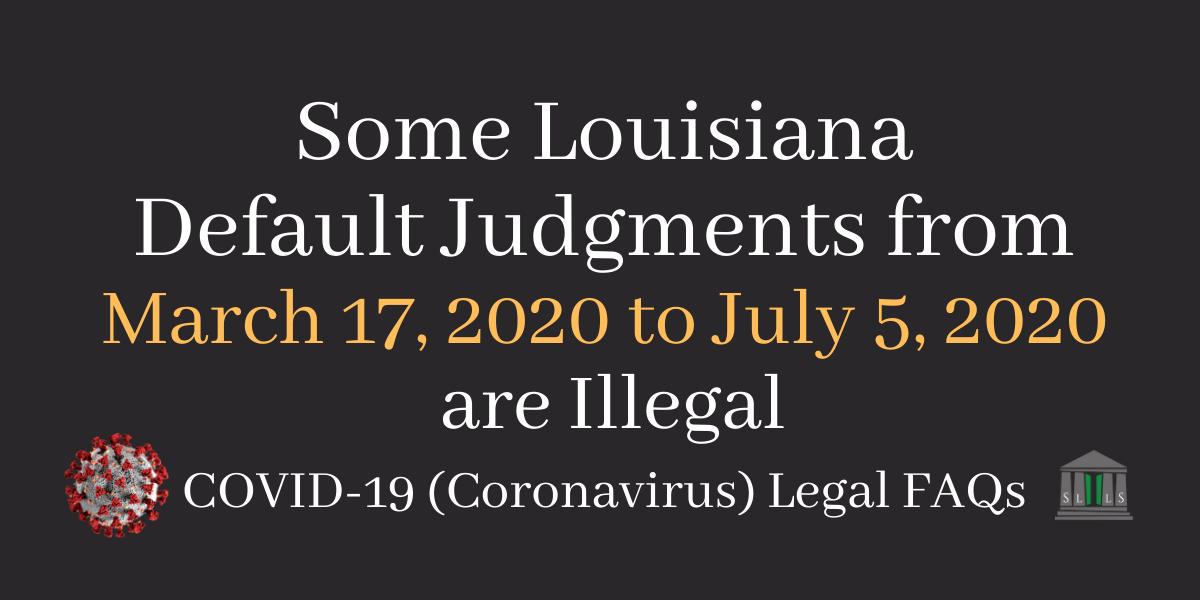Some Louisiana Default Judgments from March 17, 2020 to July 5, 2020 are Illegal
Posted on: September 18, 2020
The information provided on this post does not, and is not intended to, represent legal advice. All information available on this site is for general informational purposes only. If you need legal help, you should contact a lawyer. You may be eligible for our free legal services and can apply by calling our Covid Legal Hotline at 1-844-244-7871 or applying online here.
Early in the pandemic, Governor Edwards ordered that legal deadlines were “suspended.” In other words, the Governor “stopped the clock” on the deadlines to respond to a lawsuit.
Typically, when you are served court papers, you have 10-15 days to respond. The amount of time you have to respond depends on the type of court the case was filed in and the way that you were served.
- If the case is in a Justice of the Peace Court, City Court, or Parish Court, you have 10 days to respond, unless you were served by the Secretary of State. If you were served by the Secretary of State, you have at least 15 days to respond.
- If the case is in a District Court, you have 15 days to respond.
- The time is even longer, and complicated, if you were served out of state (“long arm service”).
Under the Governor’s Orders, these deadlines were suspended until July 5, 2020. If your deadline to respond fell between March 17, 2020 and July 5, 2020, you were given until July 6, 2020. For example, if your normal deadline was April 1, 2020, you had until July 6, 2020.
If you do not respond to a lawsuit before the deadline, a “default judgment” may be entered against you. This can give the other side everything they asked for in the case.
If a default judgment was granted against you between March 17, 2020 and July 5, 2020, it’s possible that this judgment may have been illegal.
If you believe that a default judgment against you may have been improper, you should speak to an attorney. Southeast Louisiana Legal Services may be able to provide free legal assistance. You can apply by calling 1-844-244-7871.
What can I do if a default judgment was entered against me?
A Petition for Nullity might be filed to remove the judgment. This is a written request to the court asking that the judgment be vacated.
A Petition for Nullity has some complicated legal rules. It is best if a lawyer can draft it for you.
If a default judgment was granted against you between March 17, 2020 and July 5, 2020, a Petition for Nullity may be able to get it removed, since the deadline for you to respond was extended to July 6, 2020 under the Governor’s Order.
But the Petition for Nullity does not make it so you win the suit. It just gives you a chance to start over and file a response. Eventually, the suit can go to judgment again, after both sides have a chance to make their legal claims. In some cases an attorney may advise you that filing for nullity will not help, because they see no way for you to win the case. Sometimes like this, filing for nullity would just increase court costs you have to pay.
The court will want a filing and service fee to file the petition. More information on what you can do if you cannot afford to pay the filing fees and other court costs can be found here.
What happens if I don’t do anything?
If you do not dispute the default judgment, the other side will be able to collect on it (like any other judgment). This may include garnishing your wages or bank account, or getting liens against your property. The judgment may also show up on your credit report and hurt your credit score.
